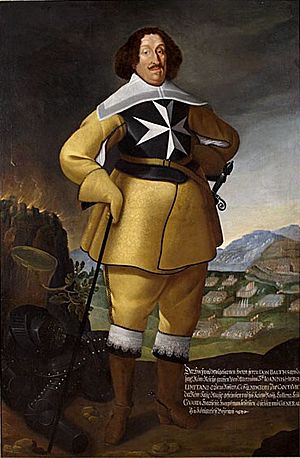Baltasar Marradas facts for kids
Quick facts for kids
Count
Baltasar Marradas
knight of Malta
|
|
|---|---|

Anonymous portrait of Baltasar Marradas from the Military History Institute in Prague
|
|
| Native name |
Baltazar de Marradas et Vique
|
| Born | 28 November 1560 Valencia |
| Died | 12 August 1638 (aged 77) Prague, Habsburg monarchy |
| Allegiance | Habsburg |
| Battles/wars | Long Turkish War, Uskok War, Thirty Years' War |
Don Baltasar de Marradas et Vique (born November 28, 1560, in Valencia, Spain – died August 12, 1638, in Prague) was a Spanish nobleman. He became a very important military leader, known as an imperial field marshal, during the Thirty Years' War. He also served as the governor of Bohemia.
Contents
Who Was Baltasar Marradas?
Baltasar Marradas came from a noble family in Spain. His family had a long history of serving the king as admirals, ambassadors, and generals. From a young age, Baltasar learned about weapons and military skills.
He became a knight of Malta, which was a religious and military order. As a knight, he traveled and fought in different places like Piedmont, Milan, and Flanders. People thought he was a brave soldier and a great knight.
His Military Career
In 1599, Marradas arrived at the court of Emperor Rudolf II. At this time, a big conflict called the Long Turkish War was happening.
Later, in 1617, he fought in the Uskok War against the Republic of Venice. He helped defend a place called Gradisca. In 1619, during a war against Frederick V, Marradas led a Spanish cavalry (horseback soldiers) regiment.
Rising Through the Ranks
Even without huge military victories, Baltasar Marradas was promoted. In 1621, he became an imperial count and received a lot of land. By 1626, he was made a field marshal, which is a very high rank in the army. The next year, in 1627, he became a lieutenant general.
Marradas was involved in important discussions about another powerful general named Wallenstein. In 1630, he took part in talks to remove Wallenstein from his position.
Challenges and Later Years
In 1631, when troops from Saxony attacked Prague, Marradas decided to retreat without a fight. After some other difficulties in Silesia, he was removed from his command in 1632. This happened because Wallenstein wanted him out.
However, Marradas later played a key role in the events that led to Wallenstein's death in 1634. After this, Baltasar Marradas was appointed as a special commissioner for the army of Bohemia. He received a good monthly payment for this role.
Baltasar Marradas passed away in 1638. At the time of his death, he was a trusted advisor to the emperor and still served as the governor of Bohemia.
See also
 In Spanish: Baltasar de Marradas y Vich para niños
In Spanish: Baltasar de Marradas y Vich para niños
 | Valerie Thomas |
 | Frederick McKinley Jones |
 | George Edward Alcorn Jr. |
 | Thomas Mensah |

